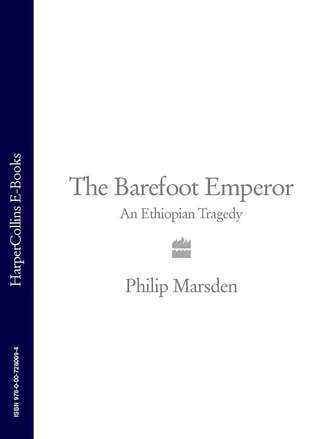
Полная версия
The Barefoot Emperor: An Ethiopian Tragedy
The missionary Henry Stern saw the change in Tewodros as sudden: ‘he boldly burst the barriers which had hitherto restrained his impetuous temper, and threw aside the garb of sanctity which had disguised his true character’. Likewise in 1863, the acting French vice-consul Guillaume Lejean watched
In truth, the emperor’s behaviour had been pretty extreme for several years. With Tewodros, there were always spells of good humour, acts of forgiveness, moments of generosity, gestures that surprised everyone around him with their humility and grace. Yet they were more infrequent, and interspersed with such savage rage that few trusted him any more. him rid himself of ‘the last scruple which had restrained him on the edge of a terrible brink’.
Many put it down to grief. The moderating counsel of Bell and Plowden had gone, though most pointed to his losing the intimacy of Tewabach, his ‘good genius’.
In 1860, Tewodros had married again. Tirunesh Wube was the daughter of his former rival Dejazmach Wube – meaning that the daughter of each of his great enemies had become his wife. When Tirunesh produced an heir, Alemayehu, five hundred prisoners were freed in celebration. But the marriage was not a happy one. Tirunesh resented her husband, the upstart conqueror of her father’s kingdom. Little is known of their time together, in part because there was not much of it. But a story tells of him walking into her tent, and her failing to rise. ‘Iam conversing with a greater king than you,’ she muttered, continuing to read from the Psalms. Tirunesh – and Abune Selama – were now the only two who dared stand up to Tewodros.
He sent Tirunesh and their son Alemayehu to Meqdela, and took his pick from the women of the camp. ‘Since the death of my good queen,’ he said, ‘I have been leading an un-Christian and disreputable life.’
If there was, as Stern and Lejean suggest, a moment that marked Tewodros’s decline, it was the first few months of 1863. On 10 February, the emperor rode out of Debre Tabor. He was heading for Gojjam, where Tedla Gwalu, scion of the old ruling family, had recently built up a formidable band of rebels. Tewodros riding at the head of his vast army was still an impressive sight. A traveller’s description of him at this time gives a sense of his striking presence:
‘The forehead is high, and tends to be prominent. His eye is black, full of fire, quick and piercing. His mouth is perfect, and the smile, which during the conversation continually played upon it, was exceedingly agreeable, I may say fascinating … His manner was peculiarly pleasant, and even polite, and his general expression, even when his features were at rest, was one of intelligence and benevolence.’
For several days, the army marched south. When they approached the Blue Nile, Tewodros stood in the fort by the old Portuguese bridge and watched his forces pass. Hour after hour they flowed down the rocky slope. With Tewodros was Lejean, who recorded the sight: ‘Cavalry, infantry, baggage and followers all descend, or rather roll, like a thick cloud of dust, amidst the glittering of thousands of lances.’ Lejean estimated that 40,000 crossed the small bridge. Tewodros, ‘that indefatigable marcher’, then bounded up the slope. Lejean struggled behind him.
Конец ознакомительного фрагмента.
Текст предоставлен ООО «ЛитРес».
Прочитайте эту книгу целиком, купив полную легальную версию на ЛитРес.
Безопасно оплатить книгу можно банковской картой Visa, MasterCard, Maestro, со счета мобильного телефона, с платежного терминала, в салоне МТС или Связной, через PayPal, WebMoney, Яндекс.Деньги, QIWI Кошелек, бонусными картами или другим удобным Вам способом.





